| Srl | Item |
| 1 |
ID:
120283
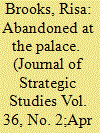

|
|
|
| 2 |
ID:
120295
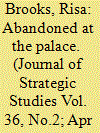

|
|
|
|
|
| Publication |
2013.
|
| Summary/Abstract |
Many analysts have focused on the Tunisian protests and the economic and political grievances that fueled them. Equally central, however, was the role played by the military leadership and the decision to forgo using force to actively suppress the protesters. Contrary to arguments that stress the reflexively apolitical or professional nature of the military, or its leaders' normative commitment to supporting the protesters, this article explains how the decisions made reflected political calculations and served the military's organizational interests. Although heralded as the savior of the revolution, the Tunisian military acted out of its own organizational self-interest in defecting from the Ben Ali regime.
|
|
|
|
|
|
|
|
|
|
|
|
|
|
|
|
| 3 |
ID:
120294
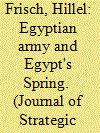

|
|
|
|
|
| Publication |
2013.
|
| Summary/Abstract |
After Mubarak's ouster, the Egyptian senior command had assumed a guardian role similar to the former Turkish model despite a shoddy performance in maintaining public order and the questionable loyalty of the lower ranked officers and the ordinary soldiers. Its relative success in managing the transition was due to the willingness of the Muslim Brotherhood and the Salafists to negotiate as stakeholders in the system rather than to battle in the streets against the Army. The Muslim Brotherhood's strategy worked. In August 2012, recently elected President Morsi subordinated the military by removing the veteran Minister of Defense, the Chief-of-Staff, and other key officers. The military caved in without a whimper.
|
|
|
|
|
|
|
|
|
|
|
|
|
|
|
|
| 4 |
ID:
120282
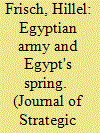

|
|
|
|
|
| Publication |
2013.
|
| Summary/Abstract |
After Mubarak's ouster, the Egyptian senior command had assumed a guardian role similar to the former Turkish model despite a shoddy performance in maintaining public order and the questionable loyalty of the lower ranked officers and the ordinary soldiers. Its relative success in managing the transition was due to the willingness of the Muslim Brotherhood and the Salafists to negotiate as stakeholders in the system rather than to battle in the streets against the Army. The Muslim Brotherhood strategy worked. In August 2012, recently elected president Morsi subordinated the military by removing the veteran Minister of Defence, the Chief-of-Staff, and other key officers. The military caved in without a whimper.
|
|
|
|
|
|
|
|
|
|
|
|
|
|
|
|
| 5 |
ID:
120299


|
|
|
|
|
| Publication |
2013.
|
| Summary/Abstract |
This article examines the initial Western response to the Arab Spring. Traditional interests - oil, counterterrorism, containing Iran, and the security of Israel - offer only a limited explanation. Domestic politics and a humanitarian agenda explain some variation, but they too are insufficient. A number of leaders appeared to believe change would happen no matter what, so it was often better to embrace it than fight it. Others desired to showcase a new model, where the United States would not necessarily lead. Western powers also recognized the limits of their power and desired to maintain alliances with conservative countries like Saudi Arabia.
|
|
|
|
|
|
|
|
|
|
|
|
|
|
|
|
| 6 |
ID:
120296


|
|
|
|
|
| Publication |
2013.
|
| Summary/Abstract |
Although seen by many as an unequivocal supporter of Gaddafi's power basis, the Libyan military's reaction to the 2011 uprising was far from unified: plagued by desertion as well as disintegration, the regime managed to rely only on the hard core of its armed forces. This was mostly a result of the regime's decade-long coup-proofing measures which rendered it in large parts militarily useless. Weakened at the micro level, the Libyan military was incapable of acting at the macro level in any meaningful way. Sitting at the analytical intersection between internal and external features of the armed forces, the Libyan case provides useful insights on the study of the armed forces.
|
|
|
|
|
|
|
|
|
|
|
|
|
|
|
|
| 7 |
ID:
120298
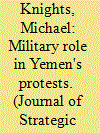

|
|
|
|
|
| Publication |
2013.
|
| Summary/Abstract |
Saleh's solution to 'the civil-military problematic' (to borrow Peter Feaver's phrase) was to build powerful praetorian units and place his relatives in command of them, a counter-productive approach that ultimately increased the risk that Saleh faced. During Yemen's Arab Spring uprisings, sections of the armed forces not controlled by President Ali Abd'allah Saleh's siblings and cousins sought to ride the wave of popular revolt and emerge as a cohesive power-base in the post-Saleh period. To achieve these aims the military establishment made a conscious effort to let the tribes and civil society activists lead the assault on the Saleh government.
|
|
|
|
|
|
|
|
|
|
|
|
|
|
|
|
| 8 |
ID:
120281
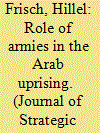

|
|
|
|
|
| Publication |
2013.
|
| Summary/Abstract |
The following special issue on the role of armed forces focuses on what explains the considerable variation in the both how these uprisings palyed themselves out and their political outcomes.At least three basic dimensions - duration, political intensity and the magnitude of violence - the variation between the six states covered in this issue - Egypt, Syria, Libya, Tunisia, Yemen and Bahrain - has been considerable even on a proportionate basis. The range of political outcomes within these six cases has been considerable, ranging from a more or less stable transition to democracy in Tunisia to the Syrian case where there is considerable fear that Syria will break up into sectarian mini-states.
|
|
|
|
|
|
|
|
|
|
|
|
|
|
|
|
| 9 |
ID:
120293


|
|
|
|
|
| Publication |
2013.
|
| Summary/Abstract |
The following special issue on the role of armed forces focuses on what explains the considerable variation in both how these uprisings played themselves out and their political outcomes. At least three basic dimensions - duration, political intensity and the magnitude of violence - the variation Between the six states covered in this issue - Egypt, Syria, Libya, Tunisia, Yemn and Bahrain - has been considerable even on a proportionate basis. The range of political outcomes within these six cases has been considerable, ranging from a more or less stable transition to democracy in Tunisia to the Syrian case where there is considerable fear that Syria will break up into sectarian mini-states.
|
|
|
|
|
|
|
|
|
|
|
|
|
|
|
|
| 10 |
ID:
120297


|
|
|
|
|
| Publication |
2013.
|
| Summary/Abstract |
The Bahraini security forces fulfilled their task of defending the regime without any qualms during the uprising that occurred in February and March 2011. The regime's coup-proofing strategy has been efficient. It is notably based on the exclusion of the Shias from the security apparatus in a country where the ruling dynasty comes from the Sunni minority and where the opposition is dominated by Shia Islamic movements. However, the recruitment pattern of the Bahraini security forces also results from the general civil-military relations characteristic of all the Gulf states. The increasingly tense factionalism inside the regime is likely to have an impact on the security forces.
|
|
|
|
|
|
|
|
|
|
|
|
|
|
|
|